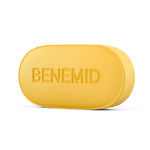PAIN RELIEF
Email | 612.873.6090
Buy Benemid without prescription

Description of Benemid
Benemid is a medication used to help the body eliminate uric acid through urine, which reduces the levels of uric acid in the body. It is primarily used to treat gout and gouty arthritis. Benemid can also be taken with penicillin antibiotics to enhance their effectiveness.
How to take Benemid?
It is important to take Benemid as prescribed by your doctor. Do not take more than what is recommended or for longer than the prescribed duration. Drinking plenty of water while taking Benemid can help prevent kidney stones. Along with the medication, a complete treatment program may include dietary changes, other medications, and mineral supplements, as directed by your doctor. Regular testing of your blood or urine may be required to ensure the medication is not causing any harmful effects.
Store Benemid at room temperature and keep it away from moisture and heat.
What to do if a dose is missed or an overdose occurs?
If you miss a dose of Benemid, take it as soon as you remember. However, if it is almost time for your next dose, skip the missed dose and continue with your regular dosing schedule. Do not take extra medication to make up for the missed dose.
If you suspect an overdose of Benemid, seek immediate medical attention. Symptoms of overdose may include stomach upset, vomiting, or nausea.
Side effects
Get emergency medical help if you have any of these signs of an allergic reaction:
- hives
- difficulty breathing
- swelling of your face, lips, tongue, or throat
Call your doctor at once if you have a serious side effect such as:
- worsening gout symptoms
- severe pain in your side or lower back
- blood in your urine
- swelling, especially in your face, stomach, ankles, or feet
- pale or yellowed skin, dark colored urine, fever, confusion or weakness
Less serious side effects may include:
- urinating more than usual
- mild nausea, vomiting, loss of appetite
- headache, dizziness
- sore gums
- mild itching or skin rash
- hair loss
- warmth, redness, or tingly feeling under your skin
This is not a complete list of side effects and others may occur. Tell your doctor about any unusual or bothersome side effect.
When not to use?
Do not take Benemid if:
- You are allergic to Probenecid or any of the drug's components.
- You have uric acid stones (a type of kidney stones).
- You experience a gout attack that has already started.
- You have a blood cell disorder such as anemia.
- You have a decreased white blood cells count.
Benemid should not be given to a child younger than 2 years old.
Warnings
Before taking Benemid, tell your doctor if you:
- Have kidney disease.
- Have a history of stomach ulcer.
- Have ever had kidney stones.
- Are pregnant.
- Are nursing a baby.
If you have any of these conditions, you may need a dose adjustment or special tests to safely take Benemid.
What other drugs will affect Benemid?
Inform your doctor if you are using:
- lorazepam (Ativan)
- methotrexate (Rheumatrex, Trexall)
- rifampin (Rifadin, Rifamate, Rimactane)
- diabetes medication you take by mouth
- an NSAID (a nonsteroidal anti-inflammatory drug) such as ketoprofen (Orudis, Oruvail), indomethacin (Indocin), meclofenamate (Meclomen), or naproxen (Aleve, Anaprox, Naprosyn)
- salicylates such as aspirin, Novasal, Doan's Extra Strength, Salflex, Tricosal, and others
- a sulfa drug such as Bactrim, Cotrim, Septra, SMX/TMP, and others
This list is not complete and there may be other drugs that can interact with Benemid.
Tell your doctor about all your prescription and over-the-counter medications, vitamins, minerals, herbal products, and drugs prescribed by other doctors. Do not start a new medication without telling your doctor.
